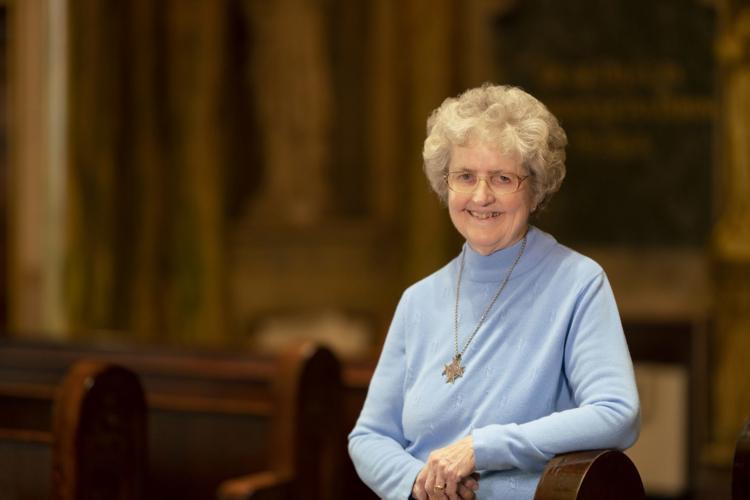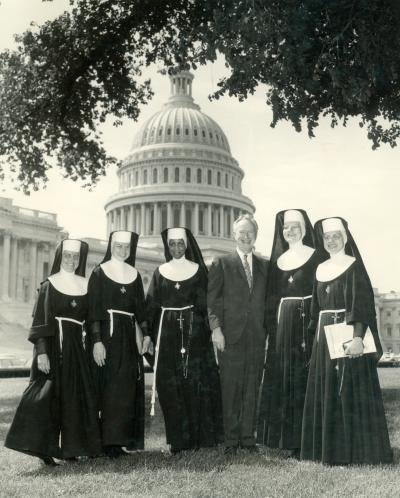Getting on the stage at Viterbo University’s Fine Arts Center Main Theatre and sharing her vast knowledge of the Franciscan Sisters of Perpetual Adoration will mostly be an agreeable task for Mary Ann Gschwind, FSPA. Mostly.
“I don’t mind speaking in public, but I do mind trying to get 170-plus years of history into 45 minutes,” said Sr. Gschwind, who took her vows in 1960 and has been the FSPA archivist for more than 17 years.
On Thursday, March 19, starting at 7 p.m., Sr. Gschwind will present “The Story of the Franciscan Sisters of Perpetual Adoration” in the Fine Arts Center as part of the D.B. Reinhart Institute for Ethics in Leadership Lecture series. The lecture also coincides with the university’s celebration of Founders Day, saluting the FSPA for starting Viterbo.
As FSPA archivist, Sr. Gschwind is immersed in the stories and mementoes left behind by the sisters who came before her, often gleaning insights into their histories through their memoirs.
The FSPA traces its roots to a small religious community that migrated from Bavaria to Milwaukee in May 1849, relocating over the next two decades to other Wisconsin towns before establishing the St. Rose of Viterbo Convent in La Crosse in 1871. The school the sisters established in 1890 to train teachers for Catholic schools grew into a first-class institution of higher education now called Viterbo University, from which Sr. Gschwind received a bachelor’s degree in 1965.
The first part of Sr. Gschwind’s lecture will focus on early leaders of the FSPA, who not only planted the seeds of Viterbo University but started St. Francis Hospital, the first private hospital in western Wisconsin. Particularly noteworthy among the early leaders are Mother Antonia Herb, who brought the order to La Crosse, and Mother Ludovica Keller, the order’s second leader in La Crosse, serving from 1882–1928.
These two early leaders established the convent, chapel, school, and hospital for which the FSPA is mainly known in La Crosse. The second part of Sr. Gschwind’s talk will cover lesser known FSPA missions that took sisters far from their beloved convent. She calls this section of the talk “Expanding Our Boundaries.”
In 1883, the same year the sisters opened St. Francis Hospital, the sisters built their first “home mission,” opening St. Mary’s Boarding School on an Indian reservation in Odanah, Wis. The boarding school, which remained open until 1969, was plagued every year by flooding of the Bad River.
A second home mission was operated from 1948–88 in Canton, Miss., where sisters gave shelter and solace to people beaten and teargassed in civil rights protests, Sr. Gschwind said.
Overseas FSPA missions have been operated in China and El Salvador and are still going in Guam. One of the sisters who served in China in the 1940s wrote about having to hide their typewriter in a bed with a sick sister because Chinese soldiers would snatch up every scrap of metal they could find to make bullets. And flooding in China could be even worse than at Odanah, with sisters lining up benches to serve as bridges to get between buildings.
Sisters who served at those remote missions endured many hardships, not least of which was loneliness, and Sr. Gschwind wants to make sure their efforts are remembered.
“I want people to know that the sisters had a lot of courage and perseverance to go where they’d never been before,” she said. “The sisters who went to these places had many challenges and faced them with courage.”
The third portion of Sr. Gschwind’s lecture covers the wide variety of activities FSPA members are involved in now. These include efforts to promote environmental responsibility and social justice (especially fighting human trafficking), operating Franciscan spirituality centers in La Crosse, Arbor Vitae, Wis., and Cedar Rapids, Iowa, and providing time and financial support to many La Crosse area organizations, from the Boys & Girls of Clubs Greater La Crosse and Catholic Charities to mobile meals and jail ministry.
At the end of Sr. Gschwind’s lecture there will be time for questions, and it’s safe to say some of the questions will involve the FSPA’s recently announced decision to discontinue the 24-hour prayer element of perpetual adoration. Members of the FSPA and community partners will still pray every day from 6 a.m.–10 p.m., but they won’t do round-the-clock prayers, a tradition that began Aug. 1, 1878.
“It’s a wonderful ministry, and it’s not like we’re ever going to stop praying,” Sr. Gschwind said. “We’ve got to celebrate what we were able to do as long as we did it. It is who we are and is the foundation of all we do.”


